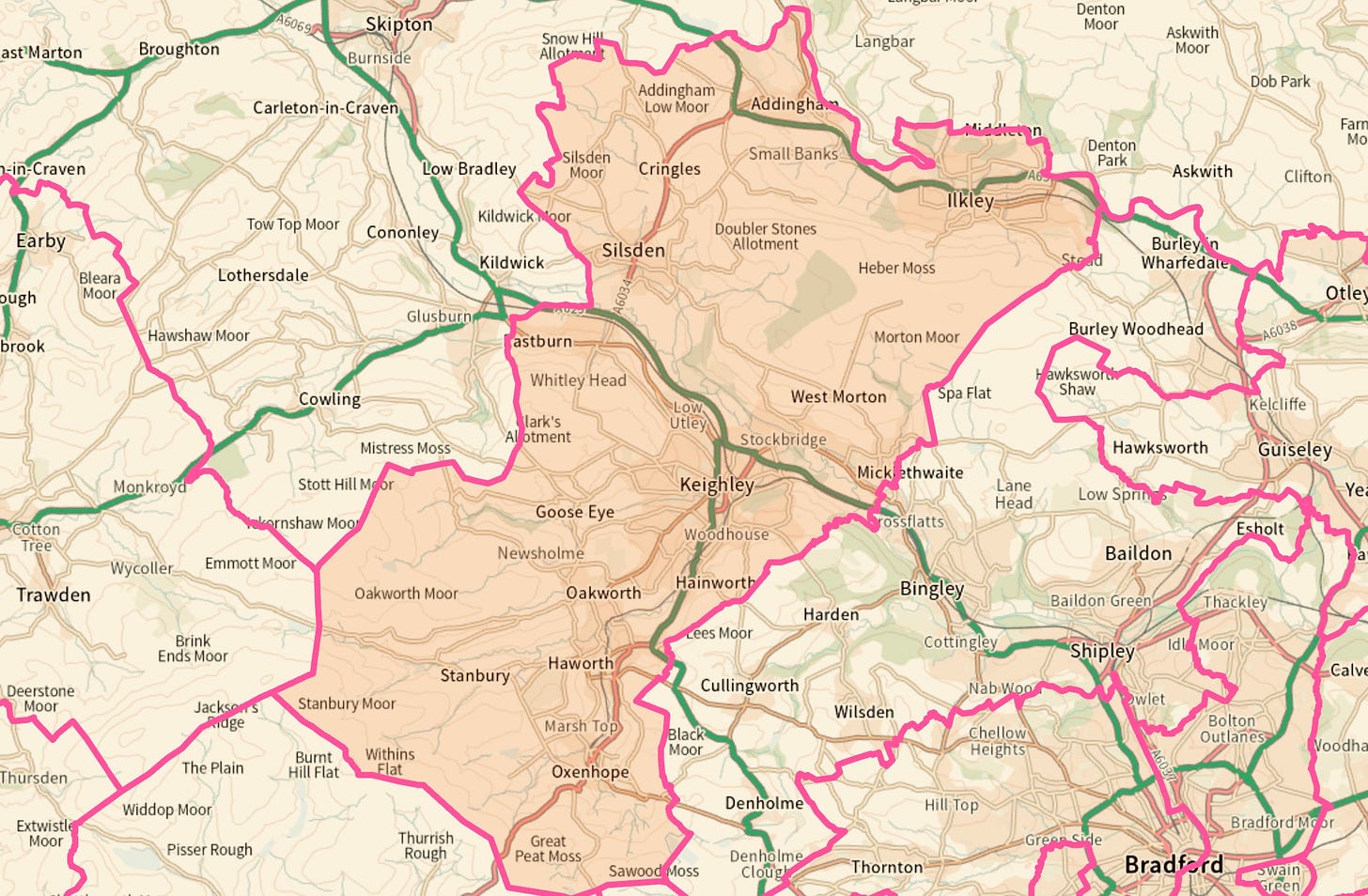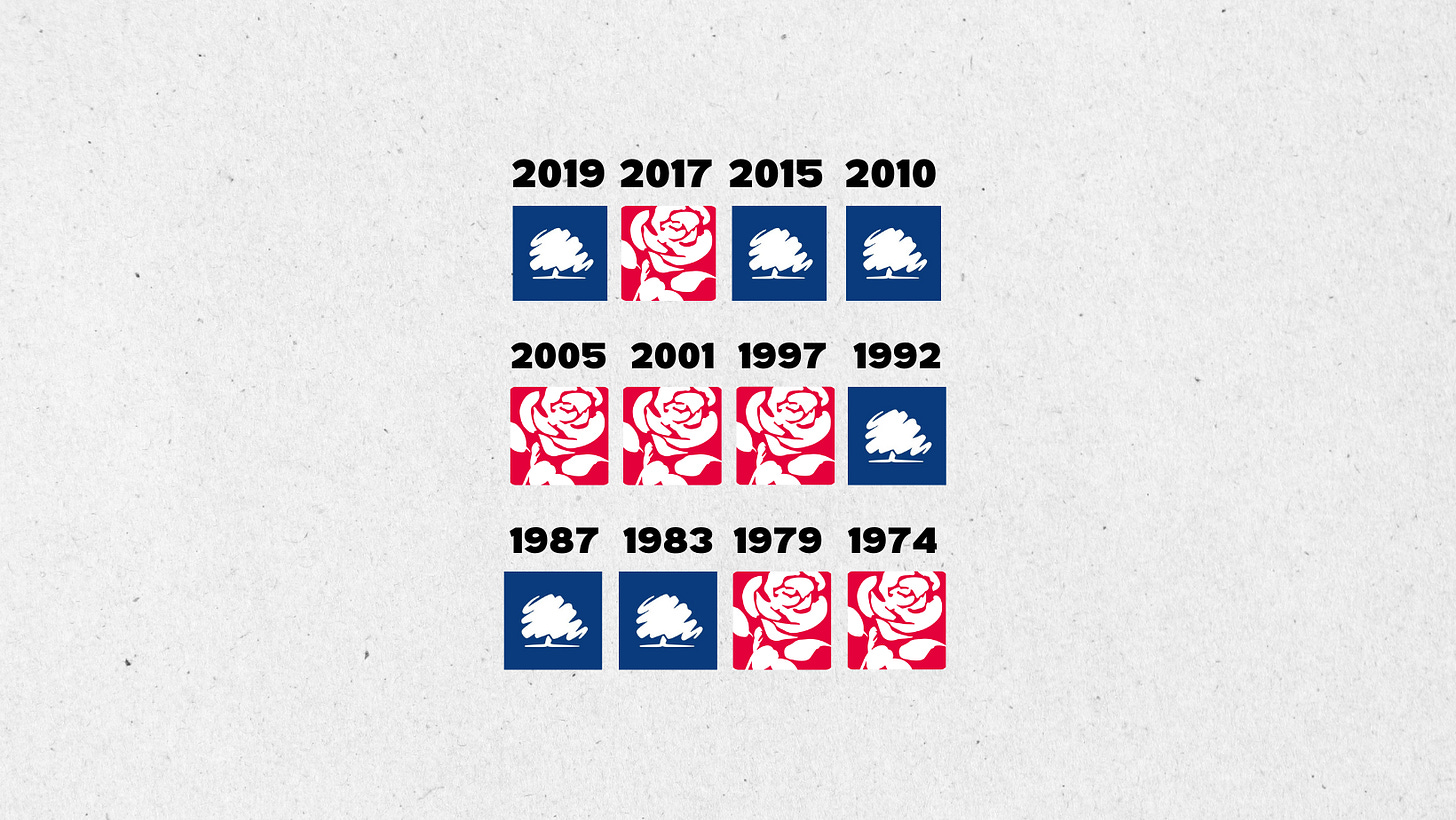The midway point: 3 weeks to polling day
Three more candidates announced, 2024 versus 2019 and a short trip down Keighley and Ilkley's recent(ish) electoral past 🗞️
Three weeks on from Rishi Sunak’s surprise and rain-soaked general election announcement, we’ve reached the midway point of the campaign. And that means three more weeks of campaigning, three more weeks of big promises and three more weeks of surprises. The football, perhaps – that’s the Euros for the non-sporty among you – will be a welcome alternative to all things politics, something different to talk about, to rally behind. Because, last time around, England were oh so close to winning. Wouldn’t that be something in a year as momentous as this?
In this edition of The Ilkley Journal we shine a small light on the rest of the candidates competing for your vote for Keighley and Ilkley, compare and contrast the 2019 general election with 2024 and take a trip down general election memory lane to look at how the constituency has voted since 2010 (and a little further back, too).
7 candidates confirmed for Keighley and Ilkley
We now have seven candidates confirmed for Keighley and Ilkley:
Chris Adams, Liberal Democrats
Dominic Atlas, Yorkshire Party
John Grogan, Labour
Andrew Judson, Reform UK
Robbie Moore, Conservative
Vaz Shabir, Independent
John Wood, Green Party
It’s a mixed bag, offering a wide spectrum of politics and ideas from familiar and less familiar names. You can read more about Grogan, Moore, Shabir and Wood here:
As for the rest, you can read about them below (we hadn’t heard anything from the Yorkshire Party, Reform UK and the Lib Dems when we went to press with that piece last week, which is why they weren’t included).
Details about the candidates and what they offering are still scant but we’ve managed to pull together a few bits on Atlas, Judson and Adams.
🔵 Dominic Atlas, Yorkshire Party
Atlas, the Yorkshire Party candidate, is a bus driver at The Keighley Bus Company. His Twitter (X) bio says he’s a dad to two “perfect girls” and that he’s “working to make their life's [sic] great as well as trying to be the best I can”.
He recently campaigned to be a councillor for Keighley West but ended up in fifth place with 113 votes (4%).
He’s not very active on Twitter (X), but his last few tweets were a:
Criticism of WYCA’s mayor, Tracy Brabin: “Anyone seen @TracyBrabin’s campaign video? Never seen someone blow smoke up their own arse as much. I'd like to say there has never been anyone more inept than her but looks who's running the country. Let's hope this lier [sic] doesn't get in.”
Post promoting a recruitment day for the bus group Transdev Blazefield
Response to a Conservative tweet attacking Labour’s supposed house policies: “You guys just voted in someone that boasted about taking money from the poorer regions of the country and gave it to the richer. Sit back down.”
🔵 Andrew Judson, Reform UK
Judson, the Reform UK candidate, describes himself as a horseman and businessman on Twitter (X). His bio states: “Do not blindly follow or believe the narrative! Judge the truth for yourself!! #notonetzero, we are not ready!”
He’s a parish councillor, representing Fell Lane and Westburn on Keighley Town Council. He also recently and unsuccessfully contested Keighley West, finishing up in fourth place – ahead of Atlas – with 297 votes (10%).
His last few tweets have been responses to:
Calvin Robinson announcing that he’s been expelled from the Conservative party: “Come over to Reform UK Father. You talk sense and can see through the narrow views of the MSM and Main Parties!”
Someone commenting that Eddie Izzard is a man: “‘Utter bollocks nonsense.’ I like that!! May have to pinch that phrase!!! Very well said!”
Narinder Kaur commenting on another post featuring the loaded line of “now tell me the great replacement is still just a theory”: “I really can not see the problem here! A few ladies just getting out of their daily lives and having a day at the beach! Wish I had the time to do the same!! Good for them!”
🟠 Chris Adams, Liberal Democrats
Finally, we have Adams, the Lib Dems candidate of Shearwater Global, formerly chief of staff to the Lib Dems’ president, Baroness Brinton.
He’s an interesting choice, as on his LinkedIn profile he appears to be based in London. It’s also not his first attempt to get into the House of Commons, campaigning in 2017 to be the parliamentary candidate for Greenwich and Woolwich (he ended up in third place with 3,785 votes).
He’s been busy reposting tweets lately, with one from:
Ed Davey thanking the Disabled Sailing Association “for a pleasant morning on the water”
Adam Bienkov pointing a migration chart with commentary that reads, “here’s what happened to migration since we left the EU”
Jessica Elgot posting several snaps of the Lib Dems’ senior team with the comment, “Sarah Olney is not loving this”
2019 election versus 2024 election
In terms of what has changed since the last election in 2019 – when Boris Johnson returned the Conservatives to Number 10 with a majority and Labour felt like it had no hope in hell of ever getting out of its electoral slump – this time around we have no representative from the Social Democratic Party (SDP). Given that they only managed 132 votes in 2019 and haven’t fielded a candidate here before, it’s no major surprise.
Speaking to The Ilkley Journal, Paul Shkurka, SDP Yorkshire & Humber region secretary, who is standing as a candidate for Shipley, said:
“We are mega disappointed not to have had a member step forward to stand in this key constituency, particularly as we fielded a candidate in the 2019 election.
“Although membership is growing as we gain wider national recognition, we are still a relatively small party, hence our candidates tend to be limited to those areas with the greatest number of members and in which we are most active, although not exclusively so.”
There’s technically no Brexit Party either, which got 850 votes in 2019, as they’ve since morphed into Reform UK. With slogans like “make Britain great again” and “we want our country back”, as well as dog whistles like Nigel Farage’s response to Rishi Sunak’s D-day blunder: “It’s appalling and shows the man doesn’t understand. He’s not patriotic, he doesn’t care about our history, frankly our culture.” – they’ve very much adopted the Donald Trump populist playbook to try and persuade largely Conservative voters on the right (if not very right) to jump ship.
Sunak, incidentally, was born in Southampton.
Having not fielded a candidate at the 2019 general election in Keighley, the Green Party is also back for 2024. They’re hoping to do better than they did in 2017, when their candidate, Ros Brown – now a district councillor for Ilkley (which was, for 34 years, a Conservative turned independent seat – only managed 790 votes).
And, as we mentioned last week, there’s also an independent pitching to be Keighley and Ilkley’s next MP (Vaz Shabir). There wasn’t one in 2019. The last time an independent ran was in 2017, when David Crabtree, of Crabtree Care Homes, threw his hat in the ring. He got 534 votes.
How things have shaped up in Keighley and Ilkley since 2010 (and a “little” further back)
General elections are complicated. There’s always a strong local element to them, of course, but national politics also plays a big part in shaping how people vote. You can see that play out in previous results for Keighley and Ilkley since 2010 when the Conservatives entered into government after 13 years in the wilderness (in turn for this banishment, they’ve since resigned Labour to 14 years in opposition).
Generally, the seat has pretty much been Conservative over that period, with 12 of the last 14 years returning a Tory MP. While this has largely reflected national trends, it has still consistently been a very closely contested seat with Labour. It’s always been this way and support in the constituency remains very much split between the two major parties.
As for the others, it has been a mixed affair with no serious competition to the Conservatives or Labour. In terms of trends, there has always been a small but steady amount of support for right-leaning candidates. From 2010 to 2017, it was for UKIP, which has since been replaced by The Brexit Party, although support for the latter was low in 2019 (arguably the Conservatives were able to capture this voter base courtesy of Johnson, which, in turn, may have given Moore enough of a boost to get over the line).
Since then, The Brexit Party has morphed into Reform UK. Farage’s personality, his appeal to a supposedly glorious Britain of years gone by, is likely to see them do markedly better than they did in 2019 in their former incarnation. Fringe right-wing parties have all but disappeared, too, with the BNP and the National Front last seen on ballot papers in 2010.
The Lib Dems, meanwhile, have had a rollercoaster of a time, which has largely echoed the party’s national highs and lows since 2010. Keighley and Ilkley is not a seat they can realistically win but the increase in votes at the last election might suggest that their reputation is recovering in the area.
Here’s an overview of the last four elections:
🔵 2019
Conservative gain from Labour
Majority: 2,218
Electorate: 72,778 (72.3%)
Robbie Moore, Conservatives: 25,298 (48.1%)
John Grogan, Labour: 23,080 (43.9%)
Tom Franks, Liberal Democrats: 2,573 (4.9%)
Waqas Khan, The Brexit Party: 850 (1.6%)
Mark Barton, The Yorkshire Party: 667 (1.3%)
🔴 2017
Labour gain from Conservatives
Majority: 239
Electorate: 71,429 (72.4%)
John Grogan, Labour: 24,056 (46.5%)
Kris Hopkins, Conservatives: 23,817 (46.1%)
Paul Latham, UKIP: 1,291 (2.5%)
Matt Walker, Liberal Democrats: 1,226 (2.4%)
Ros Brown, Green Party: 790 (1.5%)
🔵 2015
Conservatives hold
Majority: 3,053
Electorate: 68,865 (71.3%)
Kris Hopkins, Conservatives: 21,766 (44.3%)
John Grogan, Labour: 18,713 (38.1%)
Paul Latham, UKIP: 5,662 (11.5%)
Ros Brown, Green Party: 1,661 (3.4%)
Gareth Epps, Liberal Democrats: 1,321 (2.7%)
🔵 2010
Conservative gain from Labour
Majority: 2,940
Electorate: 65,893 (72.4%)
Kris Hopkins, Conservatives: 20,003 (41.9%)
Jane Thomas, Labour: 17,063 (35.8%)
Nader Fakri, Liberal Democrats: 7,059 (14.8%)
Andrew Brons, British National Party: 1,962 (4.1%)
Paul Latham, UKIP: 1,470 (3.1%)
Going even further back, to give more of a historical perspective, Labour’s Ann Cryer held the seat in 2005 – an election that saw the once highly visible BNP leader Nick Griffin pick up 4,240 votes – and in 2001. She was first elected in 1997 beating the incumbent Gary Waller who had been MP since 1983 (who had, in turn, taken the seat from Cryer’s husband, Bob Cryer).
As you can see, Keighley and Ilkley has always been something of a bellwether seat –with a few exceptions, voters have tended to vote in candidates belonging to parties that have ended up in government.






